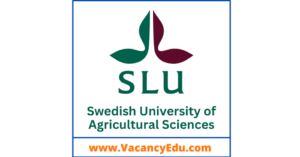Swedish University of Agricultural Sciences, Sweden invites online Application for number of Fully Funded PhD Degree at various Departments. We are providing a list of Fully Funded PhD Programs available at Swedish University of Agricultural Sciences, Sweden.
Eligible candidate may Apply as soon as possible.
(01) PhD Degree – Fully Funded
PhD position summary/title: PhD student – Mechanochemical signalling during plant morphogenesis
The apical hook is a temporary organ structure that forms at the tip of the stem (hypocotyl) in darkness, aiding the germinating seedling as it emerges through the soil. Apical hook formation serves as an excellent model to study plant morphogenesis, as it involves distinct phases of growth promotion and inhibition. The phytohormone indole-3-acetic acid (IAA) is central to plant morphogenesis. This project focuses on investigating the modulation of auxin’s spatiotemporal distribution in response to mechanochemical signals during development in Arabidopsis thaliana. The research will utilize a range of approaches, including molecular biology techniques, cell biology methods (such as confocal and electron microscopy), physiological studies and genetic analysis.
Deadline : 2025-02-28.
(02) PhD Degree – Fully Funded
PhD position summary/title: PhD position, Dissecting root exudation in boreal plants
Forests play a crucial role in reducing atmospheric carbon dioxide concentrations. Elevated levels of carbon dioxide increase carbon exudation from plant roots, but the impact of this process on nitrogen availability and consequently plant growth remains poorly understood. Carbon exudation stimulates the growth of fungi and bacteria within the rhizosphere, the soil zone closest to the roots, influencing nitrogen dynamics and plant nutrition. To optimize tree access to nitrogen and enhance growth, it is essential to understand tree root – microbe interactions. A critical knowledge gap lies in the fine-scale regulation of carbon exudation by plant roots. This PhD project addresses this gap by investigating the mechanisms underlying root exudation and its regulation. The doctoral candidate will mainly work under axenic conditions at fine root scale with boreal plants. Root exudates will be analysed with different LC-MS and GC-MS methods in close collaboration with the Swedish Metabolomics Centre https://www.swedishmetabolomicscentre.se/ The project is led by Sandra Jämtgård, Department of Forest Ecology and Management, SLU in collaboration with Peter Marhavý, Umeå Plant Science Centre, UPSC https://www.upsc.se/ and Clydecia Spitzer, SLU. The doctoral candidate will be part of multidisciplinary research team with expertise spanning plant physiology, forest ecophysiology, metabolomics, and transcriptomics, which provides good conditions for scientific exchange and discussion.
Deadline : 2025-02-18
View All Fully Funded PhD Positions Click Here
(03) PhD Degree – Fully Funded
PhD position summary/title: PhD position – Plant-soil microbial interactions and carbon cycling
We will investigate the influence of macro-microclimate decoupling on carbon cycling and soil microbial functioning in Swedish forests. Using microclimate loggers across a macroclimatic gradient, we’ll test links between forest structural complexity, macro-microclimate decoupling, and ecosystem carbon exchange via various flux measurement methods. Belowground, we will examine relationships between microclimates, soil microbial communities, and carbon cycling. Controlled climate chamber experiments simulating warming scenarios will help clarify how changes in temperature and precipitation affect microbial carbon functions. More information on the network of microclimate loggers: https://carolinegreiser.weebly.com/forestbuffer.html
The PhD position focuses on how forest vegetation structure influences macro-microclimatic decoupling and its effects on ecosystem carbon cycling. In the field, you will study how forest structure affects macro-microclimatic decoupling and how microclimates, plant diversity, and soil properties drive carbon cycling, including soil microbial responses to temperature and moisture. In the lab, you will zoom in and design climate experiments and use advanced DNA- and RNA-based techniques, potentially including transcriptomics, to analyze microbial community composition and functions. The project allows flexibility to pursue individual research ideas within forest microbial ecology and offers collaboration opportunities across Swedish ecosystems. It suits candidates interested in forest, plant, soil, or microbial ecology, with its broad scope adaptable to the student’s interests.
Deadline : 17 February 2025
(04) PhD Degree – Fully Funded
PhD position summary/title: PhD position in forest ecology with focus on C dynamics
The project will contribute assessments of the pools of PyC in the boreal systems and calibrating its transportation pathways. We will achieve this by relying on data on historic and modern fires, reconstructed with high temporal and spatial resolutions across Nordic boreal forests. Our overarching hypothesis is that pyrogenic C (PyC) presents a tangible sink of fire affected C. Such sink can potentially contribute towards a negative feedback mechanism linking an increase in climatologically-forced fire activity with larger C deposition in difficult-to-mobilize forms. In testing this hypothesis, we plan to improve methodology for reconstruction of fire activity from lacustrine sediments and test the hypothesis that landscape-specific calibration of lacustrine fire proxies improves the quality of sediment-based fire reconstructions.
Deadline : 2025-02-11.
(05) PhD Degree – Fully Funded
PhD position summary/title: PhD in Aquatic Ecology: Hydropower impacts on lake function and biodiversity
The overall study will include a range of topics; (i) fish resource and habitat use, (ii) biodiversity responses in benthic algae, invertebrates and riparian vegetation, (iii) productivity responses in bottom living algae, (iv) bird nesting and resource use.
In the project we will create three kinds of structures: (I) floating-bottom habitats, (II) impoundments which prevent bottoms from drying out and (III) small breeding islands for birds. The student will take part in studying the ecological effects of these measures on biodiversity and function of lake ecosystems. Additionally, existing gradients in hydropower impacts will be examined.
In this position, the student will have the opportunity to develop a wide range of skills, and receive support from experienced researchers in each subject area. The content of the thesis can be adjusted based on the candidate’s background and interests. Additionally, there will be opportunities to engage in mathematical modeling
The work will be carried out in collaboration with Karin Nilsson (Department of Wildlife, Fish and Environmental Studies, SLU Umeå), Gunnar Öhlund, (SLU), Åsa Widén (SLU) and Jenny Ask (Umeå University). Collaboration with representatives of the hydropower company Vattenfall will also be an important part of the position. The research project is funded by the Swedish Energy Agency.
Deadline : 2025-01-30.
Polite Follow-Up Email to Professor : When and How You should Write
Click here to know “How to write a Postdoc Job Application or Email”
(06) PhD Degree – Fully Funded
PhD position summary/title: PhD student in Biology: Functional forest landscapes for pollinators
Insect populations and diversity is declining globally, and the loss of pollinators has received especially large attention. The knowledge on pollinating insects in forest landscapes, and how these are affected by different forestry activities, is however largely lacking. This PhD project aims to increase the knowledge on how the forest structural diversity and microclimate influence pollinator populations and diversity, and how this in turn affect the pollination of key forest plant species. The PhD candidate will compare general species richness and community composition of pollinating insects, as well as habitat selection and performance in one specific bumblebee species, in forests that differ in structural diversity, microclimate and flower availability. The PhD candidate will also study the importance of insect pollination in bilberry and cowberry, in relation to forest structure and microclimate.
Deadline : 2025-01-28.
(07) PhD Degree – Fully Funded
PhD position summary/title: PhD position in aquatic microbial dispersal mechanisms
You will be part of a research project exploring the dispersal of planktonic organisms in inland saline lakes, with a particular emphasis on soda lakes. The project employs a wide range of methodologies, including laboratory and field experiments, molecular techniques, bioinformatics, and community assembly modeling.
The primary goal is to enhance our understanding of how planktonic microorganisms disperse and to use this knowledge to refine community assembly models. The project involves extensive fieldwork and sampling campaigns, complemented by molecular laboratory analyses.
Deadline : 2025-01-21.
(08) PhD Degree – Fully Funded
PhD position summary/title: PhD position focusing on adaptation strategies in filamentous cyanobacteria
The doctoral student will be part of a research group focusing on cyanobacterial ecology in aquatic environments. In the group, we use molecular, biological, and chemical methods to study characteristics of these cyanobacteria in relation to environmental variables in order to understand their living conditions and distribution.
The project includes pure bioinformatics analyses, field studies as well as controlled laboratory experiments where we will investigate local adaptation of filamentous cyanobacteria. These will be explored using several omics tools such as metagenomics, transcriptomics, and metabolomics, to define traits that control the adaptation abilities to local environmental conditions.
Deadline : 2025-01-21.
Click here to know “How to Write an Effective Cover Letter”
(09) PhD Degree – Fully Funded
PhD position summary/title: PhD position in aquatic microbial ecology and evolution
The doctoral student will be part of a research project focusing on the ecology and evolution of microbial species, with an emphasis in aquatic environments.
We will analyze publicly available and newly-acquired aquatic metagenomes and metatranscriptomes and apply advanced bioinformatic algorithms to track species, subspecies and gene turnover across space, time and environmental gradients. We will then use this data to test several hypotheses about the influence of intra-species diversity on the eco-biogeographical distribution of prokaryotic species, their response to perturbations, and the emergence of cooperative behavior. The project will strongly focus in bioinformatics analyses, but there will also be an opportunity to engage in sampling and laboratory work.
Deadline : 2025-01-21.
(10) PhD Degree – Fully Funded
PhD position summary/title: PhD position in Remote Sensing focusing on Earth System Models
The work focuses on the derivation of forest structure information from a variety of remote sensing data sources with the intention to derive useful information for vegetation demographic models (VDMs) and Earth System Models (ESM). The work is planned to involve a large span of remote sensing sources, including terrestrial laser scanning, airborne laser scanning, satellite imagery including hyperspectral (EnMAP / PRISMA), and satellite lidar (GEDI, ICESat-2). The PhD student will work in the Forest Remote Sensing group at the Department of Forest Resource Management at SLU and collaborate closely with other researchers. The work will also contribute to large European projects coordinated by SLU Division of Forest Remote sensing (FORWARDS and NextGenCarbon). Thus, the PhD work is planned to be incorporated within the work of those consortiums, and for that reason travelling within Europe is to be expected, including stays at other research institutes and universities participating in those consortia and working on the VDMs and ESMs involved. The work is carried out in English language. The research subject can be technology, forest management or biology depending on the candidate´s background.
Deadline : 2025-01-21.
Connect with Us for Latest Job updates
(11) PhD Degree – Fully Funded
PhD position summary/title: PhD student in biology: aerial eDNA for forest biodiversity survey
This doctoral project will examine the use of aerial eDNA for surveying forest-dwelling lichens and bryophytes. We aim to understand how different factors, from stand and landscape characteristics to the species’ traits, affect the detectability of species by eDNA, and to develop reliable, standardized sampling protocols to be used in practical biodiversity surveys. The project includes both field- and labwork, bioinformatics, statistics as well as preparation of scientific articles. The PhD student will be based at the Department of Ecology in Uppsala. The project includes collaborations with researchers at SLU Umeå, at Graz University of Technology, and at the Royal Botanical Garden in Edinburgh.
Deadline : 2025-01-21.
Polite Follow-Up Email to Professor : When and How You should Write
(12) PhD Degree – Fully Funded
PhD position summary/title: PhD position, riparian forest biodiversity and microclimate
We invite applications for a fully funded PhD position focused on exploring the interactions between biodiversity, microclimate, and habitat heterogeneity in riparian forests within managed landscapes in Sweden. BIOCLIMR will examine how forest management affects biodiversity and microclimate in riparian zones, i.e., key ecological corridors that support unique plant and animal communities. By studying these interactions, the research aims to inform sustainable forest management practices and enhance biodiversity conservation.
Deadline : 2025-01-21.
(13) PhD Degree – Fully Funded
PhD position summary/title: PhD position in Peatland Forestry – New Knowledge from AI Maps
Fifteen percent of Sweden’s productive forest is situated on drained peatlands. You will join a research group that develops novel, high-quality, high-resolution digital maps using AI. Our AI models, trained on national monitoring data, use high-resolution digital elevation models from airborne laser scanning to compute topographical indices as environmental covariates for mapping. This project investigates if it’s possible to enhance our understanding of forestry on drained peatlands using these novel high-resolution maps. By correlating field data from national surveys with these digital maps through multivariate statistical methods, we will investigate how groundwater levels (drainage intensity), nutrient levels (C/N ratio, base cations), and historical land use impact peat quality, tree growth, and biodiversity in drained forest peatlands.
The project is led by Anneli Ågren, Department of Forest Ecology and Management, SLU together with experts on wet soil and biodiversity. The doctoral candidate will be part of a broad research group with expertise in subjects from; GIS, AI, soil science, forest ecology, and forest management, which provides good conditions for scientific exchange and discussion.
Deadline : 2025-01-21.
(14) PhD Degree – Fully Funded
PhD position summary/title: PhD student in Biology
The aim of this project is to estimate how quickly forest insect communities in managed boreal forests are changing due to climate warming, forestry, and other factors. The changes over time are assessed by repeating a large-scale survey of bees and wasps and deadwood-dependent beetles on clearcuts fifteen years after the original survey. In another subproject, the insect fauna in clear-cuts is compared with other forest habitats. The project will generate knowledge needed when evaluating strategies for biodiversity-oriented forestry and developing monitoring programs. Furthermore, the study can inform strategies aiming at promoting bees and wasps in those vast areas of Fennoscandia that are dominated by production forests. The supervision group consists of Thomas Ranius, Erik Öckinger, Diana Rubene (all in Uppsala) and Andres Baselga (Santiago de Compostela).
Deadline : 2025-01-21.
(15) PhD Degree – Fully Funded
PhD position summary/title: PhD position, Quantification and characterization of soil carbon dynamics
Soils in boreal forests are the largest global organic carbon pool. Whether soil carbon stocks will increase or decrease in the future is one of the largest uncertainties for climate predictions, as well as for understanding the sustainability of current forest management systems. The soil C balance is determined by two key factors, net primary production (i.e., C inputs) and the C transit time (i.e., residence time) in the soil compartment. Many experiments in boreal forests have demonstrated that these two factors are tightly linked with soil nitrogen availability, where increased soil nitrogen availability both increases net primary production and reduces organic matter decomposition and soil-surface CO2 efflux, thus increasing the soil C transit time. Because N has such a pivotal role in key aspects of forest C sequestration, understanding the nature of N-C-climate interactions is increasingly crucial for understanding how the C balance of managed boreal forests may be changing. We seek a doctoral student to work within several well-established study systems to investigate the relationship between nitrogen availability and soil organic turnover rates. The PhD student will consider a range of tools, such as the 14C analysis, NMR, and/or FTIR analysis to address this area.
The doctoral candidate will be mentored by an enthusiastic and dynamic team of scientists from SLU with expertise in forest ecology, nitrogen cycling, and plant-microbe interactions. The Ph.D. candidate will conduct fieldwork, design and manage controlled experiments in a glasshouse setting, conduct molecular biology laboratory work, analyze data using innovative statistical methods, write manuscripts, and contribute to other project activities. The announced Ph.D. position is fully funded for four years, with the expectation that the student will defend their doctoral thesis at the end of this period.
Deadline : 2025-01-21.
(16) PhD Degree – Fully Funded
PhD position summary/title: PhD position, The role of herbivores for biodiversity in forest landscapes
Herbivores are important drivers of plant productivity, community composition and species richness worldwide. Northern Swedish boreal forests are grazed by large mammalian herbivores such as moose and reindeer. These herbivores are known to affect and to be affected by forest management and by biodiversity, but it is unclear how they influence ecosystem services and biodiversity in managed versus unmanaged boreal forests over longer time scales.
This PhD project will focus on the role of large mammalian herbivores for regeneration and biodiversity in northern boreal forest landscapes. The project will combine experiments and in-field measurements of herbivore pressure, habitat use and biodiversity in plots in northern Swedish forests representing 1-109 years after forest clearcutting versus 4-375 years after forest fire. It will strive to identify patterns and mechanisms by which herbivores impact tree establishment, plant and soil biodiversity across temporal and spatial scales in boreal forests.
The project is a collaboration with Maja Sundqvist, Michael Gundale and Marie-Charlotte Nilsson, Department of Forest Ecology and Management, SLU, and Robert Spitzer and Navinder Singh, Department of Wildlife, Fish and Environmental Science. The doctoral candidate will be part of a broad research group with expertise in subjects from plant and soil ecology and plant-herbivore interactions in high latitude ecosystems, which provides good conditions for scientific exchange and discussion.
Deadline : 2025-01-21.
(17) PhD Degree – Fully Funded
PhD position summary/title: PhD position, Carbon balance and biodiversity of boreal forests
Boreal forests are a key resource for Sweden’s bio-based economy while also providing other important ecosystem services related to climate change mitigation and biodiversity. Sustaining these various goals whilst future climatic changes are projected to progress most rapidly in the boreal region, will require adaptive management strategies. For this purpose, a transformation from traditional rotation forestry towards continuous cover forestry methods is debated in Scandinavia as a way forward to increase biodiversity and climate resilience. This PhD project will be based on empirical field studies with the aim to evaluate the consequences of alternative continuous cover forestry methods for key ecosystems services including timber production, carbon (C) balance and biodiversity values in the boreal region of Sweden. The study sites are part of the SLU forest long-term trial series and located across boreal Sweden. Similar data from conventional rotation-forestry sites are available for further comparison. Thus, this project will deliver an evidence-based decision support to forest stakeholders and policy makers.
The doctoral candidate will join the research group of Prof. Matthias Peichl, Department of Forest Ecology and Management, SLU. During the project, the doctoral candidate will collaborate with other graduate students and senior scientists with expertise in boreal forestry, biodiversity and ecology, which provides opportunities for cross-project interactions and development of additional areas of interest.
Deadline : 2025-01-21.
(18) PhD Degree – Fully Funded
PhD position summary/title: PhD position, Seedling ecophysiology in multilayered mixed-species forests in Sweden
Even-aged single tree species management is the dominating practice in Swedish forestry. It has been proposed that introducing higher diversity and heterogeneity into managed forests can be the way forward for: a) maximizing forest productivity under climate change, b) improving forest resilience, and c) simultaneously delivering other services (e.g. climate and biodiversity benefits.
Addressing these challenges requires a strategy for transitioning from the even-aged monocultures of today, to multilayered stands that can be managed using alternative methods, and a detailed understanding of the requirements for seedling establishment outside of the context of current regeneration practices. The project aims to lay the foundation for this transition, by studying the eco-physiological mechanisms that determine the above- and belowground requirements and limitations of seedling performance of pioneer (pine, birch) and secondary successional, or climax, tree species (spruce) in Sweden and investigating the potential for a management framework that establishes pine and spruce in overlapping stand generations.
We hypothesize that secondary successional species are adapted to combine a slow growth rate with an opportunistic strategy for acquiring unevenly distributed resources. Often, these species are referred to as “shade tolerant”, but this project will test the hypothesis that it is in fact not about enduring a low average light level, but that the radiation under a forest canopy is patchy and dappled so that higher light intensity occurs for short durations. Analogously below ground, it is known that soil nitrogen is not evenly distributed in the soil and the diverse composition of soil microorganisms and mycorrhizal fungi create a complex matrix where high nutrient availability may occur locally or for limited periods of time in the soil.
Understanding such strategies and specific requirements of pioneer and secondary successional species would guide the development of new methods for seedling regeneration in silvicultural systems outside the current rotational management system.
Deadline :2025-01-21.
(19) PhD Degree – Fully Funded
PhD position summary/title: PhD student position in fungal ecology
The doctoral project in fungal ecology aims to assess how host tree genetics and environmental factors influence the assembly of soil fungal communities, and to quantify impacts of soil fungal communities on soil carbon processes. Specifically, we aim to increase understanding of soil organic matter dynamics, and the role of soil fungal communities in those processes. The project combines field and lab experiments, fungal meta-barcoding, bioinformatics analyses, and the preparation of scientific articles. The PhD student will carry out supervised research leading to a PhD thesis and undertake course work corresponding to a minimum of 30 higher education credits. This position is based within the Forest Microbiology group and involves collaboration with researchers at the department, SLU Umeå, and Brandenburg University of Technology.
Deadline : 2025-01-21.
How to increase Brain Power – Secrets of Brain Unlocked
(20) PhD Degree – Fully Funded
PhD position summary/title: PhD position in Radar Remote Sensing of Forest
The work focuses on developing a method for using passive microwave interferometry to measure water exchange and wood density in trees. The methods are evaluated with data collected from dendrometers, water and moisture sensors, laser scanners, radar measurements, and field measurements. The PhD student will work in the Forest Remote Sensing group at the Department of Forest Resource Management at SLU and collaborate closely with other researchers in forest remote sensing. The work will also contribute to a large European project, so travel, mainly within Europe, may be part of the position.
The work involves developing technical equipment such as microwave receivers, using global positioning systems, drones, data processing, image processing, statistical modeling, field data collection, academic writing, and more.
Deadline : 2025-01-21.
(21) PhD Degree – Fully Funded
PhD position summary/title: PhD student in forest remote sensing for biodiversity assessment
The Department is looking for a PhD student within the area of Forest Remote Sensing. The PhD student will analyze patterns of biodiversity in boreal forests from remotely sensed data, including high-resolution airborne laser scanning data. The work includes development of automated methods for deriving information from the remotely sensed data, statistical analysis of the relation between the information derived from remote sensing and inventory data of key substrates and structures for biodiversity, and validation of the results including field visits. The project is multidisciplinary and the supervisors will be researchers in forest remote sensing and ecology. This means that the research subject can be technology, forest management or biology depending on the candidate’s background.
Deadline : 2025-01-21.
(22) PhD Degree – Fully Funded
PhD position summary/title: PhD position in Multi-Taxon Forest Biodiversity Assessment
The PhD project aims to address the critical challenge of balancing forest production with biodiversity conservation. The candidate will work on refining biodiversity indicators and understanding the ecological dynamics that underpin species diversity. The project includes:
· Development of predictive models for biodiversity patterns across gradients of habitat heterogeneity.
· Exploration of landscape-level factors influencing biodiversity, including historical and current land-use configurations.
· Identification of indicator species using advanced network analysis techniques.
· Investigation into temporal dynamics and area-heterogeneity trade-offs in biodiversity assessment.
The research infrastructure includes an extensive dataset from 240 sites across Sweden and Finland, detailed habitat surveys, species inventories, and advanced data from airborne laser scanning, micro-climate loggers, and eDNA sampling.
Deadline : 2025-01-21.
About The Swedish University of Agricultural Sciences, Sweden : Official website
The Swedish University of Agricultural Sciences, or Swedish Agricultural University (Swedish: Sveriges lantbruksuniversitet, SLU) is a public research university in Sweden. Although its main campus and head office is located in Ultuna, Uppsala, the university has several campuses in different parts of Sweden; the other main facilities being Alnarp in Lomma Municipality, Skara, and Umeå.
Unlike other state-owned universities in Sweden, SLU is funded through the budget for the Ministry of Enterprise and Innovation (previously the Ministry for Rural Affairs). In 2020, the university had 3,155 full-time staff, 4,216 full-time students, 559 research students and 191 professors.
Disclaimer: We try to ensure that the information we post on VacancyEdu.com is accurate. However, despite our best efforts, some of the content may contain errors. You can trust us, but please conduct your own checks too.
Related Posts
- PhD Degree (20) -Fully Funded at Luxembourg, Luxembourg

- PhD Degree (23) -Fully Funded at University of Copenhagen, Denmark

- PhD Degree (31) -Fully Funded at University of Southampton, England

- PhD Degree (24 )-Fully Funded at ETH Zurich, Switzerland

- PhD Degree (13)-Fully Funded at Karolinska Institute, Sweden

- PhD Degree (11) -Fully Funded at Cranfield University, England

- PhD Degree (34) -Fully Funded at Newcastle University, England

- PhD Degree (19) -Fully Funded at Uppsala University, Sweden

- 25 PhD Degree-Fully Funded at Technical University of Denmark (DTU), Denmark











